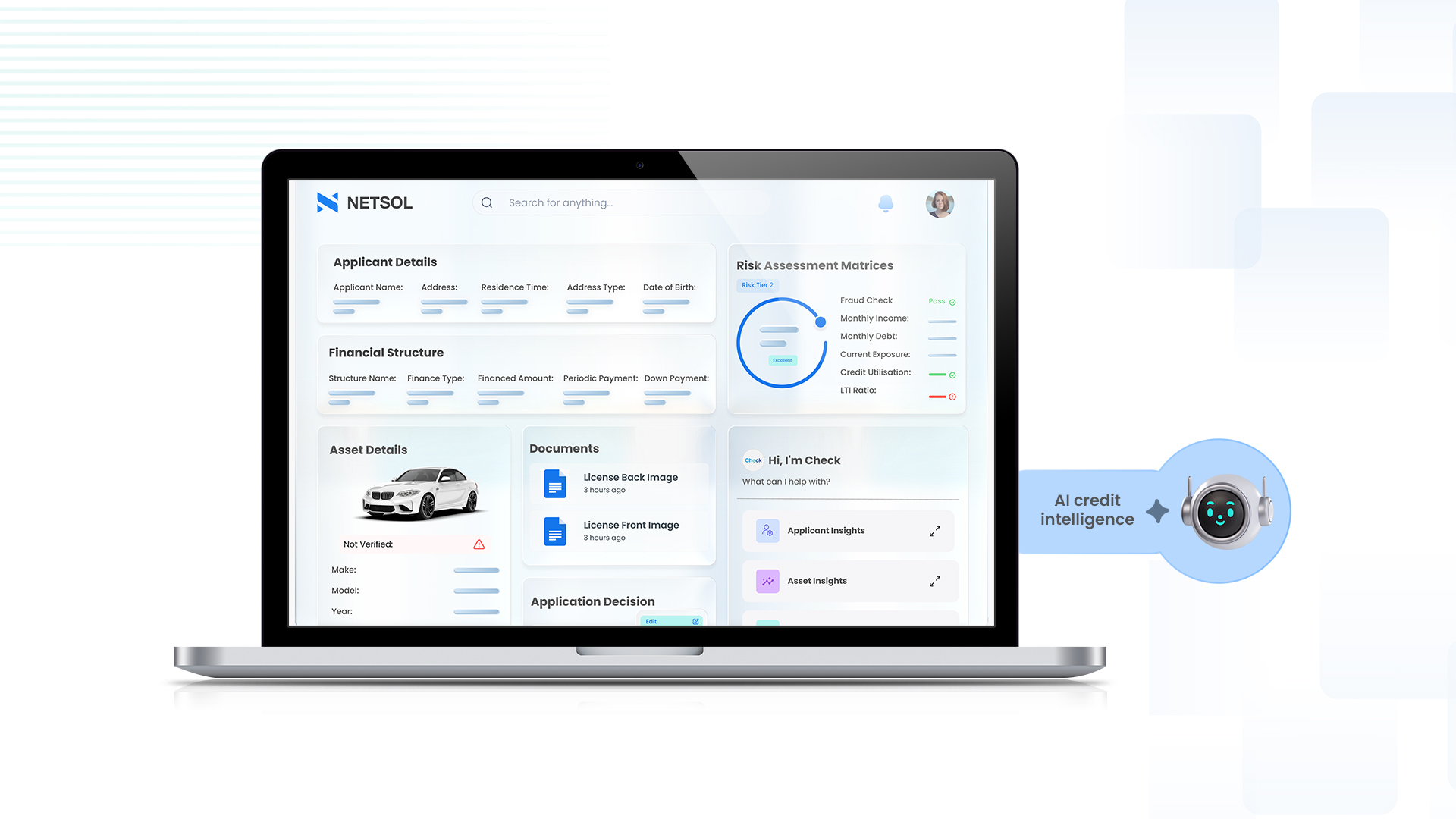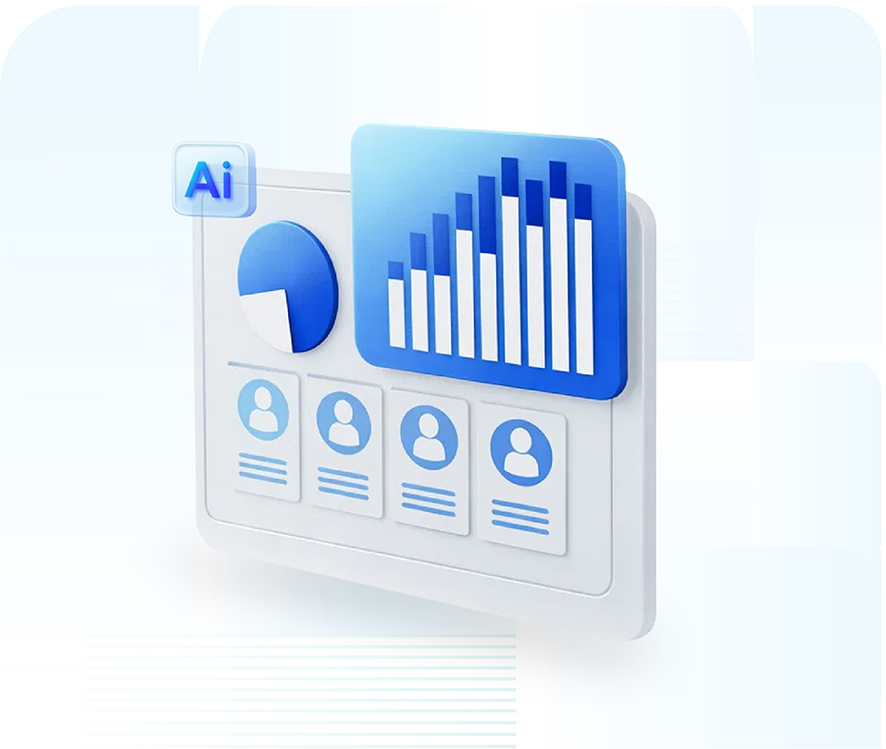Blog
New Technologies and their impact on the North American equipment leasing and financing industry
By Peter Minshall Executive Vice President at NETSOL Technologies Inc., on January 16, 2024
Explore the impact of new technologies on equipment leasing in North America. From Generative AI to API-first strategies, discover how the industry is evolving.

In the past 18 months, a significant upsurge in the demand for equipment finance has become evident. A wide range of lenders, including major banks, regional institutions, online merchants and fintech enterprises are actively considering venturing into this particular asset class.
To remain relevant in the equipment financing sector, established players must be well-prepared for potential disruptions. They should explore using positive market trends to improve loan origination while examining strategies to increase profits and cultivate stronger relationships with dealers. Moreover, due to the current economic uncertainties, it's crucial that the delinquency rates should be monitored.
Evolution of technology in leasing and financing
As the difficulties in technology investment and talent made 2022 seem turbulent, the early months of 2023 brought about a rejuvenated sense of hope for technology's role in driving progress in both the business world and the wider societal context. While Generative AI plays a pivotal role in this resurgence, it is just one of the many innovations on the horizon with the potential to promote comprehensive and sustainable advancement, addressing complex global challenges.
A broader spectrum of technological advancements is making its way to the forefront. From blockchain's potential to revolutionize transparency and security to the role of AI and machine learning in automating tasks and enhancing decision-making, these innovations hold the promise of sustainable growth. Moreover, the integration of advanced AI, often referred to as 'Gen AI', is poised to reshape and enhance the future of the financing and leasing industries, offering more intelligent and efficient solutions. In this evolving tech landscape, API-first technology also takes a prominent place. It plays a significant role in advancing systems, connecting diverse applications and streamlining data exchange, further contributing to the continuous progress in the tech industry.
According to PwC, business and technology leaders lack readiness for emerging technologies such as Generative AI. But, what does that say for the existing technologies and their use? Fresh ideas and technologies are becoming more and more common, and they're starting to have a big impact on how equipment finance companies operate. Based on economic value modeling conducted by Accenture, there's a forecast that by 2025, automation may take on approximately 7%-10% of tasks in the financial services sector. It's important to note that while these initial figures may seem relatively small, they represent the beginning of a significant transformation towards the integration of new technologies and automation in various sectors.
This shift is expected to gain momentum over the coming years. This serves as a promising start in a broader journey towards enhancing efficiency, productivity and innovation in our industries. In parallel, technology could enhance and complement about 43-48% of these tasks. This dual impact of automation and technology augmentation is anticipated to result in substantial cost reductions and increased productivity. Consequently, it has the potential to deliver a cumulative value that was estimated to be in the range of $87 billion to $140 billion for the North American financial services industry spanning from 2018 to 2025.
Generative AI and its impact in the finance and leasing industry
The transformative power of Generative AI holds the potential to reshape our daily lives, professions, banking practices and investment strategies. Its influence may rival that of the internet and the mobile device's introduction, ushering in a new era of possibilities. According to a 2023 Google Cloud Gen AI Benchmarking Study, around 82% of organizations, whether they are contemplating or already employing Generative AI, hold the belief that it will either bring a significant change or usher in a transformative impact on their respective industries.
Gen AI holds the potential for significant improvements in productivity and operational efficiency. This is particularly relevant in fields like financial services, where virtually every service or product begins with a contract, terms of service or a similar agreement. Gen AI's capacity to understand and condense complex information is exemplified in areas such as investment portfolio management, where it can efficiently analyze and summarize intricate financial documents or customer holdings across various asset classes.
Yet, the potential extends beyond this domain. Fundamentally, models like Large Language Models (LLMs) are honed in text and language, granting them a contextual grasp of human language and interactions. These attributes can significantly automate, expand and refine functions within various domains like customer service, marketing, sales and compliance. According to the McKinsey Global Institute, in the banking sector encompassing wholesale and retail, Gen AI has the potential to contribute a value ranging from $200 billion to $340 billion. This value may be derived from increased productivity, among other factors.
The API-first approach
Embracing an API-first approach is a pivotal shift in a business's digital journey, extending far beyond the realm of technical decisions. By providing widespread access to data and functionality, APIs empower companies to keep pace with the rapidly evolving digital landscape, fostering innovation and adaptability. Acting as the unseen connective tissue in our interconnected digital world, APIs seamlessly weave together previously isolated systems, facilitating effective collaborations and opening doors for businesses to transcend traditional boundaries.
In transforming into platforms, businesses can establish dynamic ecosystems that harmoniously integrate diverse services, industries and technologies. Essentially, the API-first approach enables businesses to shift from solitary entities to central hubs, around which partners, services and customers converge. This transformation holds the potential not only to reshape individual companies, but also to redefine entire industries. The power of API-first operates on a dual front: it equips businesses with the tools to navigate the digital age and positions them as pivotal players in the broader digital landscape.
At its core, the API-first strategy involves creating Application Programming Interfaces (APIs) from the outset of a product's lifecycle, streamlining integration, boosting efficiency and ensuring robust scalability. As with any transformative shift, the API-first approach ushers in a host of benefits and challenges, particularly from the vantage point of business and product owners.
In response to the dynamic shifts in the financial services sector, industry players are increasingly engaging with API-first technology companies. This collaboration aims to seamlessly introduce cutting-edge applications into their established platforms and systems, harnessing the power of API-based solutions. The integration of modular applications through APIs has emerged as a vital element in the ever-evolving digital business landscape. It equips organizations to not only meet, but also proactively adapt to the changing preferences of their customers and the demands of the market.
As customer preferences continue to evolve, the demand for quicker and more personalized solutions is on the rise. In light of these changing dynamics, the financial services sector must begin its digital transformation journey by prioritizing the enhancement of the customer experience. Kamran Khalid, Chief Product Officer at NETSOL Technologies, mentioned in a recent podcast that convenience is a big deal. Finding the right solution is always a challenge for organizations. They often hire consultants, spend a lot of time and money looking for a vendor to replace their current solutions.
Even after this, they might face various issues during implementation and remain unsure if they made the right choice. This is where API-first technology comes in. Instead of replacing their whole system, organizations can just pick an API-first solution for specific problems, like calculations or customer service, and easily add it to their existing setup. They don't have to start from scratch. So, convenience is key here.
By making the customer the central focus of their operations and leveraging technology for innovative solutions, businesses can effectively stand their ground against competition. Prioritizing customer-centric strategies, offering a seamless and digitally-driven journey, places a strong emphasis on integrating cutting-edge solutions that yield the most outstanding customer experiences.
Companies have moved away from the practice of regularly handling major transformation projects. The constraints of time and expertise make it challenging to choose the appropriate products for capitalizing on new market opportunities. Moreover, companies are no longer willing to shoulder the burden of managing multiple siloed systems. Instead, they are in pursuit of a unified suite of digital solutions. Complex and disjointed systems act as obstacles to the generation of fresh ideas, hindering the development and deployment of new features and products.
Most financial institutions have realized the significant potential that APIs hold for the modernization of their intricate legacy systems. According to research from MarketsandMarkets, the global API management market is already making significant progress, reaching a market value of $5.1 billion in 2023. This signifies a substantial growth compared to its 2018 standing, with an average annual growth rate of 33%. Looking further ahead, Adroit Market Research foresees the global API market surpassing the $21 billion mark by the year 2028. These forecasts underscore the influential role that APIs are poised to take on in reshaping the financial industry.
Security difficulties with new technology
Technology serves as a powerful enabler, yet it also introduces unescapable and possibly high-impact risks. In the contemporary landscape, cyber risks, such as data breaches, compromised accounts, data loss and IT system disruptions, dominate the forefront of concerns. However, it's important to recognize that these do not encompass the entirety of IT-related risks that warrant the collective attention of both board members and management.
Within the financial sector, a range of risks emerge from the misalignment between business and IT strategies, managerial decisions that inflate IT-related costs and complexity, and challenges tied to talent gaps or mismatches. The technology utilized by financial companies may become outdated, susceptible to disruptions or uncompetitive with legacy systems hindering adaptability. Mergers and acquisitions can introduce complications to the organization's IT environment, often underestimated in terms of budgeting and resolution.
Concurrently, technology-driven startups and disruptive fintech solutions are reshaping the core business models and processes of many institutions, necessitating swift adaptation for sustained relevance and viability. To effectively counter the repercussions of such attacks, it is imperative to establish a robust backup strategy and implement robust data encryption or tokenization measures for data at rest, rendering it unsuccessful to potential hackers in the event of a security breach.
Open banking has brought about some great new ideas, but it's also made things tougher when it comes to keeping data and APIs secure for fintech companies. In open banking, a lot of different systems communicate using APIs. This constant communication has made APIs a popular target for cyberattacks. As a result, there are now more ways for unauthorized people to access sensitive information, which makes the impact of a security breach even worse.
Furthermore, as the reliance on third-party services and cloud-based solutions continues to surge, businesses, particularly those in the fintech sector, will face substantial challenges related to cloud security and supply chain attacks. Cybercriminals are increasingly likely to exploit vulnerabilities in these areas, potentially impacting a significant number of companies with each attack. Hence, it is crucial for organizations to adopt a zero-trust framework for accessing sensitive systems and data. This framework necessitates not only thorough user authentication, but also ongoing and vigilant identity monitoring and validation.
Conclusion
Looking ahead, the future of the financial services industry in the United States promises a dynamic landscape shaped by technological advancements and shifting consumer preferences. The industry is likely to witness a continued influx of innovative technologies, with Generative AI playing a pivotal role in streamlining operations and enhancing customer experiences. An API-first approach will empower businesses to adapt to the rapidly evolving digital landscape, fostering collaboration and innovation. The prioritization of customer-centric strategies and seamless, digitally-driven journeys will become increasingly critical as customers demand more personalized solutions.
However, alongside these opportunities, the sector will also grapple with cybersecurity challenges and the need to align business and IT strategies effectively. As financial institutions adapt to these changes, they will need to balance the adoption of cutting-edge technologies with risk management, all while keeping customer satisfaction at the forefront. The financial services industry is on the brink of a transformative era, where innovation and adaptability will be the keys to success in the years to come. In this evolving landscape, it's imperative for financial institutions to remain agile, adapt to changing technologies and prioritize security measures to ensure long-term success.
Choosing a partner who can support a financial services business navigate all of these issues, from overall strategy of core system versus a modular or API-first approach, and then manage all of the security issues surrounding these decisions is vital. Few partners can provide this holistic service and yet there are major advantages when delivery comes out of a single hand.
NETSOL recently introduced Appex Now - The world's first marketplace for API-first products for the North American and global finance and leasing industry. With over four decades of experience in the equipment finance and leasing industry, the company continues to enable numerous equipment finance and leasing companies in North America and worldwide to digitally transform and futureproof their operations.
For three consecutive years, NETSOL has also been selected as the "most innovative company in the equipment finance ecosystem" (sustaining category), solidifying its position as a leading solutions provider to the industry, which continuously works on the latest technologies that continue to gain traction in the equipment finance and leasing industry.
Related blogs

Blog
From credit checks to credit intelligence: How AI is redefining underwriting for captives

Blog
Shared financing models for high-value assets unlocking Indonesia’s next wave of growth

Blog



